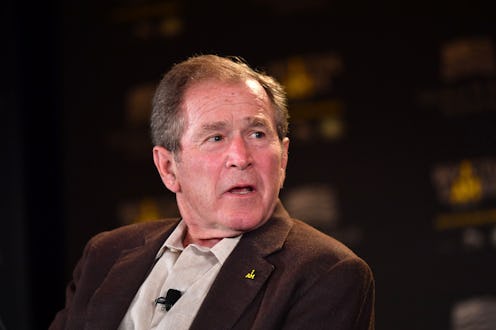News
George W. Bush's Daughter Thinks He's A Feminist

"W stands for women" was a slogan pushed by the Bush campaign during the 2000 and 2004 elections. And it appears that Jenna Bush Hager, the 43rd president's daughter, genuinely bought into it. In an interview with People, she claimed to see George W. Bush as a feminist. "People laugh at this, but I think my dad was a feminist," she told the magazine. "He showed us that we could be whatever we wanted to be. I want my girls to feel that way. I want them to feel strong and capable and feel like they can conquer the world."
With Bush's presidency over a decade into the past and with a president as arguably misogynistic as Donald Trump currently in office, it's easy to forget what exactly Bush's policies regarding women's rights were like. As you might have guessed, they weren't that great.
On his first day in office, Bush reinstated the "Global Gag Rule," the Reagan-era mandate blocking U.S. federal funds from going to overseas non-governmental organizations which provide abortion services or even so much as mention abortion as a viable family-planning option. President Trump did the same less than a week into his presidency.
The former president also appointed Dr. W. David Hager, a well-known obstetrician-gynecologist famous for imposing Christian beliefs on women's healthcare, to the Reproductive Health Drugs Advisory Committee. One of his gems of advice includes the recommendation that women pray their headaches and PMS symptoms away. According to Mother Jones, he additionally voted against making emergency contraception available over the counter because it would be used by women who "did not want to take responsibility for their actions and wanted a medication to relieve those consequences," and he was also against doctors prescribing contraceptives to unmarried women.
It doesn't end there. Bush heavily pushed the funding of abstinence-only education programs, resulting in a rise in teen pregnancies and sexually transmitted diseases in the U.S. Before then, the rate of teen pregnancy and the spread of STDs had been on the decline for a decade.
Women and racial minorities also experienced less protection in the workplace during Bush's presidency, as the Justice Department diminished the power of laws meant to combat workplace discrimination. In fact, the Justice Department was firmly against affirmative action during the Bush administration, and even sided with a group of white men who sued the city of Indianapolis for allegedly favoring African Americans and women for police sergeant promotions.
Bush's cuts to social programs — such as after-school programs, domestic violence programs, and programs providing early childhood and prenatal nutrition — also disproportionately affected women.
If a politician whose policies were so negative for women's livelihoods can be considered a feminist, the word clearly has no meaning anymore.